Tesla’s Powerwall is the most well-known of the rapidly growing list of home battery storage devices in Australia which includes the likes of LG, Enphase, Aquion and a host of other cool technologies. The nominal 7 kilowatt-hour (kWh) lithium-ion battery bank – designed and manufactured by the USA’s Tesla Motors – made a huge splash in the media when it was announced that Australia would be its mass-market launching ground.
The first wave of Powerwall systems are now beginning to be taken up by early adopters across the country – mainly households who are interested in the environmental benefits or for ‘techy’ reasons. Solar Choice recently had the opportunity to visit one of the first Tesla Powerwalls to be installed on Sydney’s Northern Beaches, on a home with a 5 kilowatt (kW) solar system in Manly.
The home in question is owned and occupied by David and his family, who had their solar panels installed late last year (after an introduction to Solar Choice from the Australian Solar Council) with a view to reduce their energy bills, increase their energy self-sufficiency and be ‘battery ready’ for the future. The system came equipped with a Tesla Powerwall-compatible SolarEdge inverter, with the aim of adding on one of the units once it became available. When the battery bank was installed this month, and David invited us up to have a look.
Already, David says, the Powerwall is helping his home to increase its energy independence even further than solar alone. The excess solar energy that they had been sending into the grid at a pittance is now busy filling up their batteries when no one is home. On the average day, David’s home is now purchasing only very little energy from the grid – even as we approach the shortest (and least sunny) day of the year.
David is able to access his home’s energy production and consumption data from anywhere and at any point in time via SolarEdge’s online portal. He can not only monitor instantaneous solar energy production, but can also see where his solar power is going (e.g. into his home, into his Powerwall or out to the grid), as well as historic data (such as total solar energy produced and consumed).
David says he is very happy with his system and hopes to use it to spread the word about clean energy for homes – even going to far as to invite us to bring others to see it in the future. “This seems to be the way forward,” he says. “Lots of people talk about going off the grid. Affordable solar and storage are making this dream more possible than ever.”
After reading and hearing so much about this device, it was certainly an exciting moment for our team to get to see an operational unit up close and personal. The device is large but surprisingly slim, tightly hugging the wall to which it is mounted. With its space-age design and futuristic logo, the Powerwall’s appearance was striking – especially when set against the unassuming background of a red brick Sydney home.
Compare solar & battery storage quotes from installers in your area.
© 2016 Solar Choice Pty Ltd
- Apricus Heat Pumps: An Independent Review by Solar Choice - 11 April, 2024
- Reclaim Energy Heat Pump: Independent Review by Solar Choice - 11 April, 2024
- Solar Panels Brisbane: Compare installers & prices - 9 April, 2024
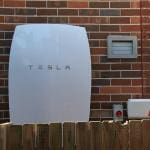
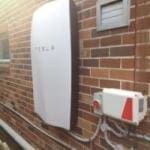

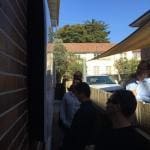
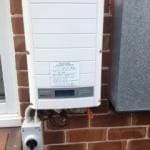
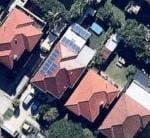
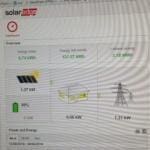

Building new house at design phase need pricing and dimensions for solar pannels, invert 5 KW and battery bank 5 kwh. Note looking at pricing for components only as fitment will be part of the design.
Hi Andrew,
Unfortunately we can only help you with the cost of a full installation – as a brokerage and comparison service, we do not hold any stock or sell any products directly. If you’d like to get pricing on a full installation, please complete the Quote Comparison request form to the right of this page.